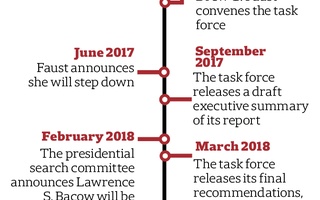The Presidential Task Force for Inclusion and Belonging released its final report earlier this week after months of substantive discussion and analysis, providing a tremendous amount of information about many University-wide issues related to diversity and inclusion. The report is impressively thorough, and we commend the Task Force for the depth with which they have considered these weighty issues. The report’s concrete recommendations and clear-cut goals for each of the University’s respective schools are especially to be applauded.
We are pleased to see that many of the issues we have opined on recently have been referenced within the report. For example, the report’s recommendation to make spaces available within the newly-renovated Smith Campus Center to support “civil disagreement” and other forms of dialogue serve as a potential for the beginnings of a multicultural center, a weighty topic within the College in recent months.
Additionally, we commend the task force for recognizing the important issue of faculty diversity and President Faust for devoting a sizable amount of funding to ameliorating it. As we have opined, and as some students know all too well, the faculty at Harvard unfortunately do not reflect the diversity of the student body across spectrums of race, gender, religion, ideology, and more.
We believe that this lack of diversity has troubling implications for the culture of the University, and we are glad to see this increase in funding to change course. Indeed, diversification could potentially lead to academic growth—a more diverse faculty could be propitious for founding a formal Ethnic Studies department and concentration within the Faculty of Arts and Sciences, something some students have been requesting for some time.
Furthermore, in the turbulent political and social context of recent months, we also find ourselves increasingly concerned with the issue of ideological diversity. The free exchange of ideas representing the multitude of views and identities found on Harvard’s campus is essential to our continued success as a university. We are pleased to see the Task Force has not left “academic freedom” out of the many ways in which the University could better facilitate inclusion, especially when it is profoundly liberal. We hope that the $10 million that President Faust has set aside for hiring new faculty members includes those who hold contrarian or marginalized political views.
Of course, focusing on ideological diversity should in no way diminish attempts to redress other perceived inequalities across racial and social lines. In receiving this report, Harvard now has to take on the difficult and nuanced job of addressing all forms of diversity on campus, and not leave any behind.
The report encourages the University to “become its best self,” for the sake of its own good and the public’s. We can only achieve this by working together to address all the ways in which individuals may feel unwelcome on our campus. This report provides a starting road map for the advocacy efforts required going forward, and we are eager to see the University take clear, active steps to respond to it. There is, after all, so much work ahead.
This staff editorial solely represents the majority view of The Crimson Editorial Board. It is the product of discussions at regular Editorial Board meetings. In order to ensure the impartiality of our journalism, Crimson editors who choose to opine and vote at these meetings are not involved in the reporting of articles on similar topics.
Read more in Opinion
Wellness at the the Law School: Promises to Keep and Miles to Go Before We Sleep

















